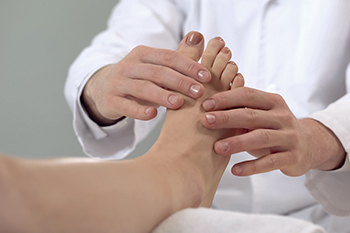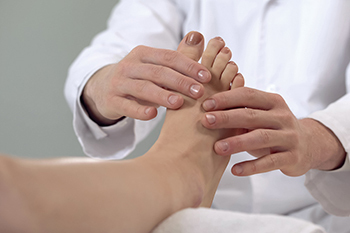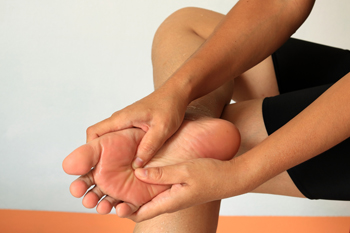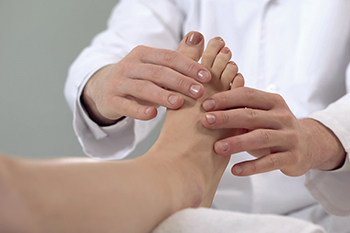Connect With Us
Blog
Items filtered by date: September 2022
Heel Pain Can Be Treated!
Metatarsal Stress Fractures

The foot is made up of tiny bones, called metatarsals. A metatarsal stress fracture is an acute fracture of one of these little bones. This usually occurs from overuse or poor foot mechanics. When bodies break down, they generally break down at the weakest point. In sports, stress fractures are caused by repetitive force over a long period of time. Metatarsal fractures can happen from wearing the wrong shoes, training on hard pavement and poor nutrition. These factors puts one at higher risk for developing stress fractures. Symptoms of metatarsal stress fractures are dull, underlying pain, that can be intermittent. One should not ignore pain of any sort. In fact, catching and treating pain early can help metatarsal stress fractures heal quicker than if ignored. If you feel you have sustained a stress fracture or have any other pain in your feet, it is suggested that you consult with a podiatrist who can diagnose the problem and get you back to full functioning as soon as possible.
Activities where too much pressure is put on the feet can cause stress fractures. To learn more, contact Dr. Royall from Mountain View Foot & Ankle Clinic. Our doctor can provide the care you need to keep your pain free and on your feet.
Dealing with Stress Fractures of the Foot and Ankle
Stress fractures occur in the foot and ankle when muscles in these areas weaken from too much or too little use. The feet and ankles then lose support when walking or running from the impact of the ground. Since there is no protection, the bones receive the full impact of each step. Stress on the feet can cause cracks to form in the bones, thus creating stress fractures.
What Are Stress Fractures?
Stress fractures occur frequently in individuals whose daily activities cause great impact on the feet and ankles. Stress factors are most common among:
- Runners
- People affected with Osteoporosis
- Tennis or basketball players
- Gymnasts
- High impact workouts
Symptoms
Pain from the fractures occur in the area of the fractures and can be constant or intermittent. It will often cause sharp or dull pain with swelling and tenderness. Engaging in any kind of activity which involves high impact will aggravate pain.
If you have any questions please feel free to contact our office located in Lehi, UT . We offer the newest diagnostic and treatment technologies for all your foot and ankle needs.
Foot Stretches Can Positively Affect the Overall Body

The feet carry the weight of the body, and it can help the overall body to keep them as healthy as possible. Stretching the feet is simple to do, and the benefits outweigh the time it takes to practice effective foot stretches. Specific stretches can improve range of motion, and may maintain strength and flexibility. An effective foot stretch is done sitting in a chair, with the feet flat on the floor. While keeping the toes on the ground, the heels are lifted until only the balls of the feet and toes can touch the ground. Also, the toes can become stronger when the foot is kept on the floor, while spreading the toes as wide as possible. Additionally, a good stretch for the toes involves crossing one leg over the other, and moving the toes with the hand back and forth. There are various stretches that can be done for different parts of the foot. If you would like more information about how to perform these, please consult a podiatrist.
Why Stretching Is Important for Your Feet
Stretching the feet is a great way to prevent injuries. If you have any concerns with your feet consult with Dr. Royall from Mountain View Foot & Ankle Clinic. Our doctor will assess your condition and provide you with quality foot and ankle treatment.
Stretching the Feet
Stretching the muscles in the foot is an important part in any physical activity. Feet that are tight can lead to less flexibility and make you more prone to injury. One of the most common forms of foot pain, plantar fasciitis, can be stretched out to help ease the pain. Stretching can not only ease pain from plantar fasciitis but also prevent it as well. However, it is important to see a podiatrist first to determine if stretching is right for you. Podiatrists can also recommend other ways to stretch your feet. Once you know whether stretching is right for you, here are some excellent stretches you can do.
- Using a foam roller or any cylindrical object (a water bottle or soda can will do), roll the object under your foot back and forth. You should also exert pressure on the object. Be sure to do this to both feet for a minute. Do this exercise three times each.
- Similar to the previous exercise, take a ball, such as a tennis ball, and roll it under your foot while seated and exert pressure on it.
- Grab a resistance band or towel and take a seat. If you are using a towel, fold it length wise. Next put either one between the ball of your foot and heel and pull with both hands on each side towards you. Hold this for 15 seconds and then switch feet. Do this three times for each foot.
- Finally hold your big toe while crossing one leg over the other. Pull the toe towards you and hold for 15 seconds. Once again do this three times per foot.
It is best to go easy when first stretching your foot and work your way up. If your foot starts hurting, stop exercising to ice and rest the foot. It is advised that you then see a podiatrist for help.
If you have any questions, please feel free to contact our office located in Lehi, UT . We offer the newest diagnostic and treatment technologies for all your foot care needs.
Four Categories of Neuropathy

A malfunction of the nerves is a condition that is referred to as neuropathy. This can happen as a result of having a specific disease, or from enduring an injury. Research has indicated that neuropathy is divided into four categories. Peripheral neuropathy generally affects the nerves that are part of the peripheral nervous system, and are located outside of the brain and spinal cord. The nerves that exit from the brain are referred to as the cranial nerves. Cranial neuropathy can happen when one of these 12 nerves become damaged. The most common types of this type of neuropathy are optic and auditory. If one of the nerves in the involuntary nervous system becomes damaged, this is known as autonomic neuropathy. Digestion, sexual response, and perspiration are governed by this set of nerves, and may affect nerves in other organs. When one nerve or one group of nerves are affected, it is known as focal neuropathy, and this is seen in one area of the body. There are existing medical conditions that can cause neuropathy, and can be common among diabetic patients. This can have a negative effect on the feet, and it may cause difficulty in feeling any cuts, bruises, or scrapes that have happened. If you have neuropathy, and have difficulty in feeling sensations in your feet, it is strongly suggested that you speak to a podiatrist as quickly as possible who can help you to manage this condition.
Neuropathy
Neuropathy can be a potentially serious condition, especially if it is left undiagnosed. If you have any concerns that you may be experiencing nerve loss in your feet, consult with Dr. Royall from Mountain View Foot & Ankle Clinic. Our doctor will assess your condition and provide you with quality foot and ankle treatment for neuropathy.
What Is Neuropathy?
Neuropathy is a condition that leads to damage to the nerves in the body. Peripheral neuropathy, or neuropathy that affects your peripheral nervous system, usually occurs in the feet. Neuropathy can be triggered by a number of different causes. Such causes include diabetes, infections, cancers, disorders, and toxic substances.
Symptoms of Neuropathy Include:
- Numbness
- Sensation loss
- Prickling and tingling sensations
- Throbbing, freezing, burning pains
- Muscle weakness
Those with diabetes are at serious risk due to being unable to feel an ulcer on their feet. Diabetics usually also suffer from poor blood circulation. This can lead to the wound not healing, infections occurring, and the limb may have to be amputated.
Treatment
To treat neuropathy in the foot, podiatrists will first diagnose the cause of the neuropathy. Figuring out the underlying cause of the neuropathy will allow the podiatrist to prescribe the best treatment, whether it be caused by diabetes, toxic substance exposure, infection, etc. If the nerve has not died, then it’s possible that sensation may be able to return to the foot.
Pain medication may be issued for pain. Electrical nerve stimulation can be used to stimulate nerves. If the neuropathy is caused from pressure on the nerves, then surgery may be necessary.
If you have any questions, please feel free to contact our office located in Lehi, UT . We offer the newest diagnostic and treatment technologies for all your foot care needs.
Cracked Heels in Runners

Running is a cherished form of exercise that many people across the country engage in every day. However, if a runner is not careful, they may be at risk of developing certain foot conditions. For example, running can increase the risk of developing cracked heels. Also known as heel fissures, cracked heels occur when the skin on the back of the heel becomes significantly dry and hardened. The skin may even crack due to the lack of moisture. Running can lead to cracked heels because as an individual is running, they are repeatedly hitting their heels on hard surfaces. This pounding of the heel on the ground can lead to cracked heels. Although cracked heels may not always be a serious condition in runners, they can be unsightly and uncomfortable. If you are a runner, you may protect yourself from developing this condition by removing dead skin cells from your feet with a pumice stone. You might also choose to apply a heavy moisturizer to the heels to keep them from cracking. Contact a podiatrist for more tips and tricks about preventing cracked heels in runners.
Cracked heels are unsightly and can cause further damage to your shoes and feet. If you have any concerns, contact Dr. Royall from Mountain View Foot & Ankle Clinic. Our doctor can provide the care you need to keep you pain-free and on your feet.
Cracked Heels
Cracked heels appear unappealing and can make it harder for you walk around in sandals. Aside from looking unpleasant, cracked heels can also tear stockings, socks, and wear out your shoes. There are several methods to help restore a cracked heel and prevent further damage.
How Do You Get Them?
Dry skin is the number one culprit in creating cracked heels. Many athletes, walkers, joggers, and even swimmers suffer from cracked heels. Age and skin oil production play a role to getting cracked heels as well.
Promote Healing
Over the counter medicines can help, especially for those that need instant relief or who suffer from chronic dry feet.
Wear Socks – Wearing socks with medicated creams helps lock in moisture.
Moisturizers – Applying both day and night will help alleviate dryness which causes cracking.
Pumice Stones – These exfoliate and remove dead skin, which allows for smoother moisturizer application and better absorption into the skin.
Change in Diet
Eating healthy with a well-balanced diet will give the skin a fresh and radiant look. Your body responds to the kinds of food you ingest. Omega-3 fatty acids and zinc supplements can also revitalize skin tissue.
Most importantly, seek professional help if unsure how to proceed in treating cracked heels. A podiatrist will help you with any questions or information needed.
If you have any questions, please feel free to contact our office located in Lehi, UT . We offer the newest diagnostic and treatment technologies for all your foot care needs.
Blog Archives
- April 2025
- March 2025
- February 2025
- January 2025
- December 2024
- November 2024
- October 2024
- September 2024
- August 2024
- July 2024
- June 2024
- May 2024
- April 2024
- March 2024
- February 2024
- January 2024
- December 2023
- November 2023
- October 2023
- September 2023
- August 2023
- July 2023
- June 2023
- May 2023
- April 2023
- March 2023
- February 2023
- January 2023
- December 2022
- November 2022
- October 2022
- September 2022
- August 2022
- July 2022
- June 2022
- May 2022
- April 2022
- March 2022
- February 2022
- January 2022
- December 2021
- November 2021
- October 2021
- September 2021
- August 2021
- July 2021
- June 2021
- May 2021
- April 2021
- March 2021
- February 2021
- January 2021
- December 2020
- November 2020
- October 2020

